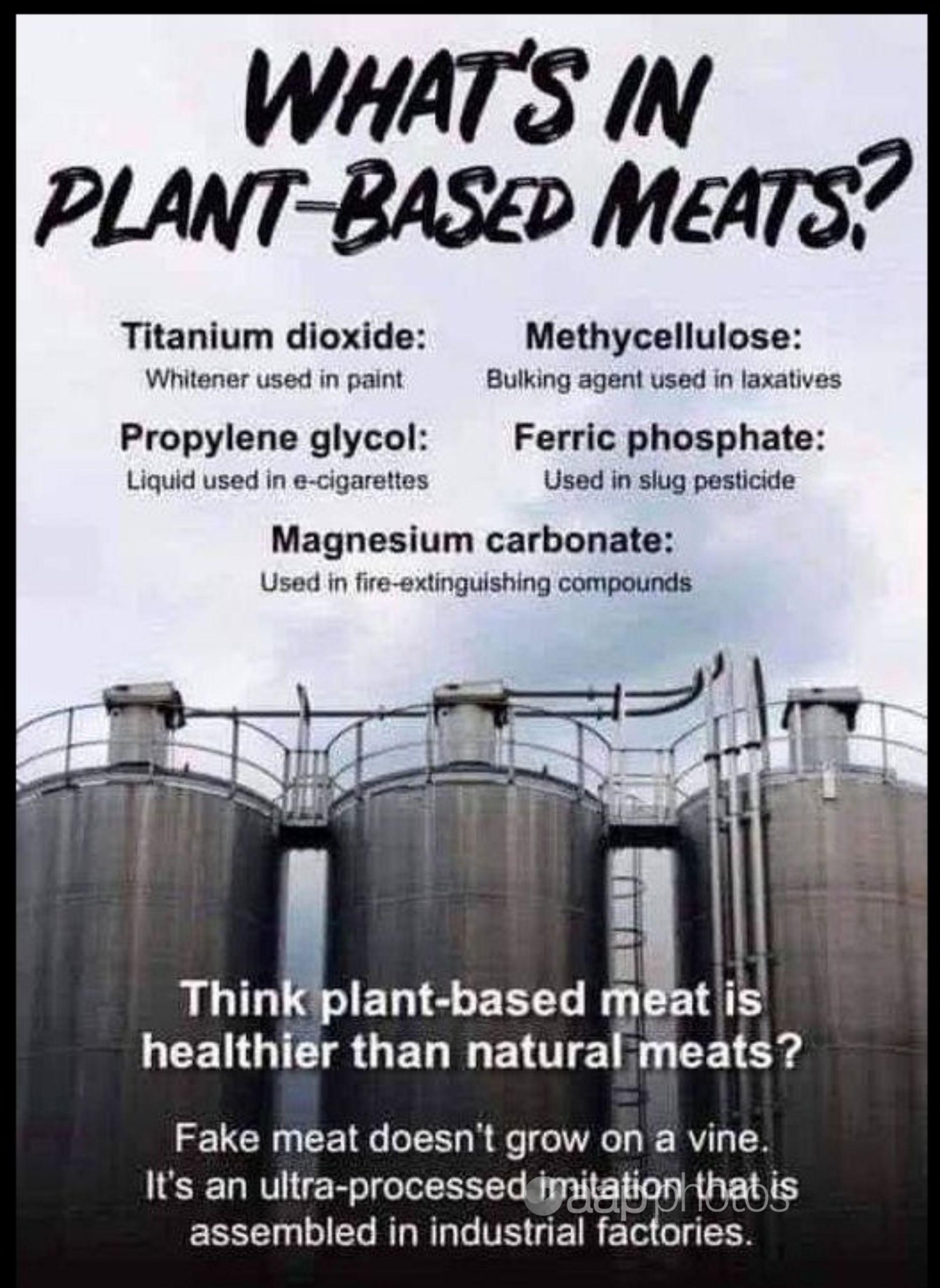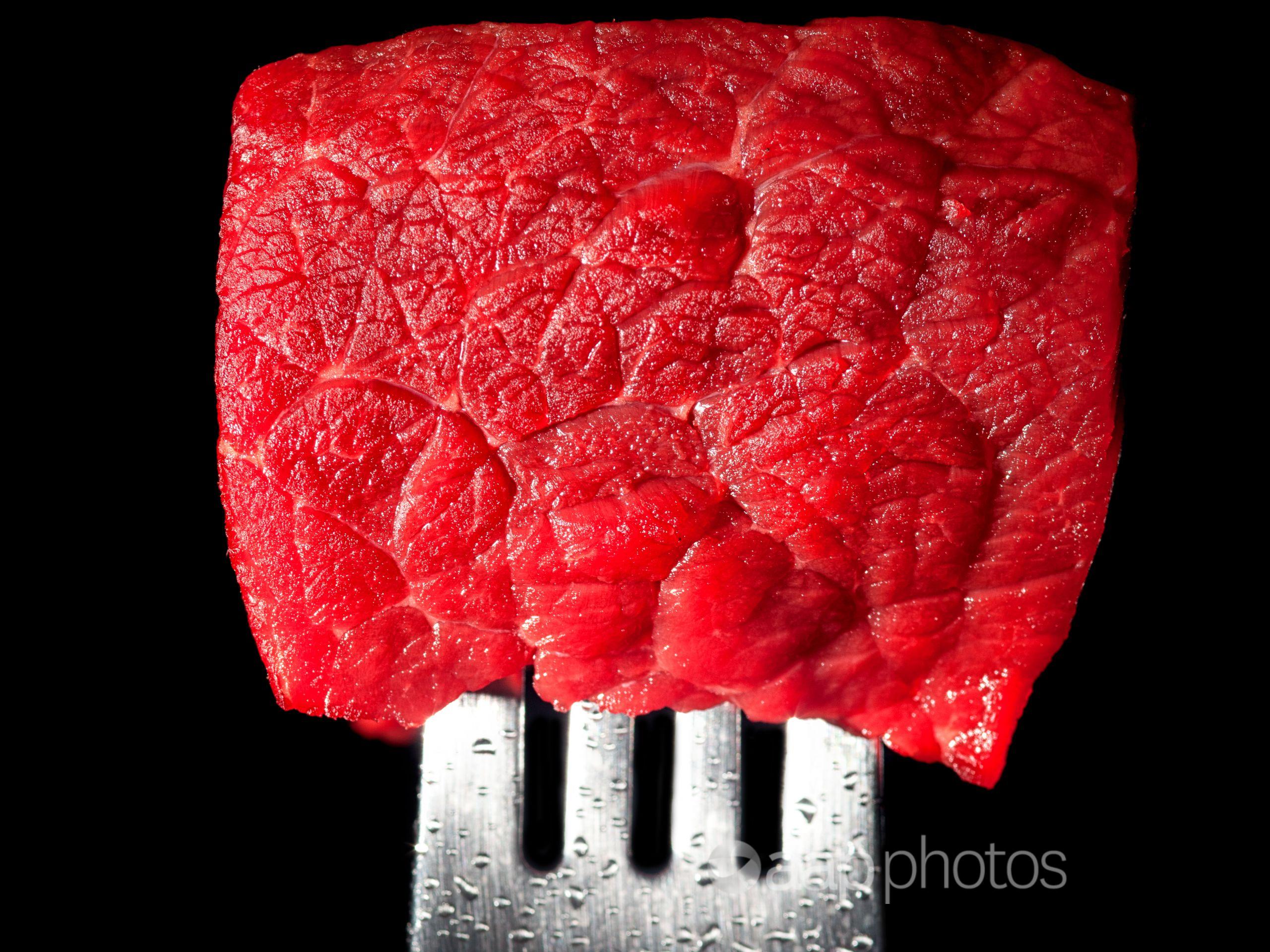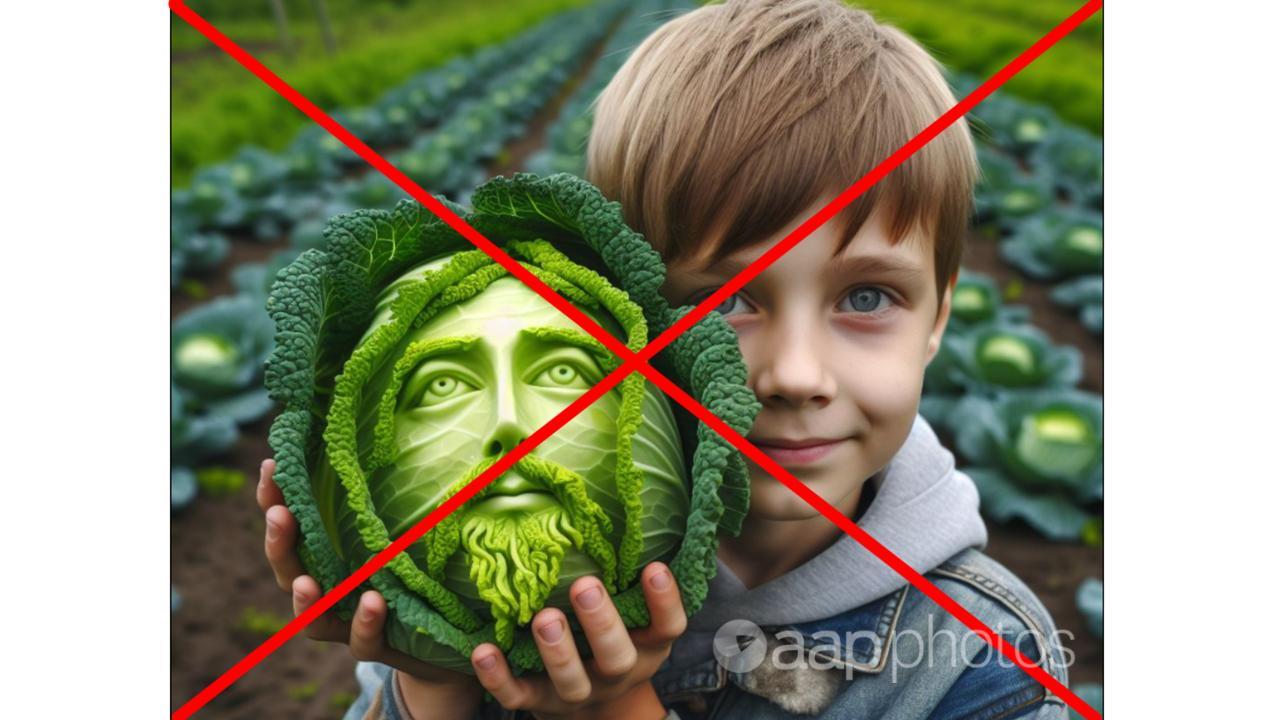The Statement
A social media post questions whether plant-based meats are healthier than natural meats by listing how some ingredients used in the foods also feature in toxic products.
A Facebook user, whose location is listed as Wellington, New Zealand and who describes herself as the “chairman and CEO at NZ Truth Warriors”, posted the meme on December 10.
It features a chemical plant as a background image and highlights five claimed ingredients in plant-based meats alongside how they are used in other products: titanium dioxide (whitener used in paint); methylcellulose (bulking agent used in laxatives); propylene glycol (liquid used in e-cigarettes); ferric phosphate (used in slug pesticide); and magnesium carbonate (used in fire-extinguishing compounds).
“Think plant-based meat is healthier than natural meats?” the meme asks. “Fake meat doesn’t grow on a vine. It’s an ultra-processed imitation that is assembled in industrial factories.”
At the time of writing, the post had been shared more than 325 times and attracted more than 15,000 views.

The Analysis
With the possible exception of ferric phosphate, which is not on the schedule of food additives permitted in Australia and New Zealand, the meme correctly lists ingredients that may be found in plant-based meat substitutes – or “meat analogues“.
The post implies the ingredients could be toxic, however experts told AAP FactCheck the additives have been used safely in many types of processed foods.
While the meme does not provide a source for the information, it matches a newspaper ad linked to the US-based Center for Consumer Freedom, which has run a campaign against “fake meat”.
The organisation is listed on its website as a non-profit “devoted to promoting personal responsibility and protecting consumer choices” although it has been described by the New York Times as a public-relations outfit with financial backers in the meat and food industries.
On a dedicated website, it lists various ingredients contained in plant-based meat items. All of the additives included in the meme except for ferric phosphate appear in the list, although the remainder besides methylcellulose feature in only a handful of products.
AAP FactCheck found the ingredients listed for products on the site to generally match the products’ listed ingredients on manufacturer or third-party sites (see sample comparisons here and here; here and here; and here and here).
Nevertheless, the list does not provide a clear indication of how widely the ingredients are used.
A 2019 analysis by Dr Benjamin Bohrer from the Canada’s University of Guelph of the ingredients in seven popular “modern meat analogue products”, such as the Beyond Burger and Impossible Burger, did not list any of the additives with the exception of methylcellulose.
To assess the safety of the five ingredients listed in the post, AAP FactCheck sought the opinion of food industry expert Gary Kennedy, the managing director of food safety consultancy Correct Food Systems.
He said the post’s comparison of plant-based meat and natural meat was misleading.
“One argument here is that because this is man-made it’s bad for you,” he told AAP FactCheck in an email, noting that unprocessed red meat had, for example, been linked to heart disease and cancer. Some researchers have recently suggested evidence of these negative health connections is weak.
Titanium dioxide is a naturally occurring mineral powder with a wide range of applications, including as a food colouring.
“It’s the white colour in paint, but it’s also the white colour in most food as well,” Mr Kennedy said.
Methylcellulose is an emulsifying agent used in cosmetics, pharmaceutics and the chemical industry, and as a bulk-forming laxative.
“Methylcellulose is a bulking agent. That one’s man-made, it doesn’t occur naturally,” Mr Kennedy said.
“You can buy it at the pharmacist. It’s a common one you take for constipation and diarrhoea as a bulking agent.”
Propylene glycol is a synthetic liquid used to absorb water and maintain moisture in some medicines, cosmetics and food products.
“If you were going to pick one that would ring alarm bills, (it) is propylene glycol, also man-made,” Mr Kennedy.
“It’s a common component of antifreeze, and when this one comes up people say, ‘Oh my God, that’s in antifreeze.’ And it is, but there are legal levels of propylene glycol (in food).”
Ferric phosphate, also known as iron phosphate, is approved as a food additive in the US by the FDA where it is used as a nutrient supplement.
“Ferric phosphate is not approved in Australia or the EU,” Mr Kennedy said. “It is approved in the US. It’s a chemical that’s actually approved in the organic farming industry as a natural pesticide. That’s why it’s found in snail bait.”
Magnesium carbonate is a magnesium salt and is a common over-the-counter remedy for heartburn and upset stomachs. As a food additive, it is used as a bleaching agent or as a colour-retention agent.
“You can buy magnesium carbonate as a dietary supplement. It’s commonly consumed by humans,” Mr Kennedy said.
When AAP FactCheck asked whether the presence of these ingredients in plant-based meat made the products unhealthy, Mr Kennedy said they did not.
“The level these are being used at are the levels they are being used in lots of other foods as well,” he said.
Julian Cox, associate professor of food microbiology at the University of New South Wales, told AAP FactCheck he often sees memes like the Facebook post used “out of context”.
“That is, often, some of the chemicals are indeed a natural component of the food products, or foods more generally,” Dr Cox said.
“Foods are made up of chemicals. Second, and related, where such chemicals are added, rather than natural components, they have a history of use and a record of safety in food products, and are indeed approved for use by regulatory authorities.
“It is misdirection to discredit by indicating their use in other products (that are) seen as harmful, suggesting these chemicals as harmful by association.”
The Verdict
While the post suggests ingredients used in plant-based meats may be unhealthy, it neglects to show that they are commonly used in many types of food. Nor does the post mention that only a small number of plant-based products contain many of the listed chemicals.
Experts told AAP FactCheck that listing the industrial uses of the additives without further information is misleading.
Missing Context – The post may mislead without additional context.
* AAP FactCheck is an accredited member of the International Fact-Checking Network. To keep up with our latest fact checks, follow us on Facebook and Twitter.
All information, text and images included on the AAP Websites is for personal use only and may not be re-written, copied, re-sold or re-distributed, framed, linked, shared onto social media or otherwise used whether for compensation of any kind or not, unless you have the prior written permission of AAP. For more information, please refer to our standard terms and conditions.


















